Google Cloud
Leveraging geospatial data to bring more local customers to stores
RetailTune helps brands connect with local customers by delivering highly personalized online and offline shopping experiences using geolocation technology on Google Maps Platform.
Can you remember the last time you bought something in a physical store? While it may not always be your first choice anymore, thanks to the convenience of being able to click, tap, or swipe your way to a quick and easy online purchase, physical stores still play an important role in the shopping experience. Heading down to your favorite store means you can see and touch items in real life, get in-person advice from sales people, and walk away with your purchase immediately, advantages that many shoppers appreciate. It’s clear that online and in-store shopping both have their benefits, and consumers want the ability to choose between the two.
Claudio Agazzi, Founder and Managing Director of Retail Tune, believes that the future of retail will comprise integrated shopping experiences that take place both online and offline. The Italian startup integrates with Google Maps Platform to help retail brands provide local shoppers with accurate and up-to-date store and product information, personalized suggestions, and directions to their nearest and most convenient store via Google Maps Platform. This enables RetailTune to help answer one of the biggest questions faced in today’s competitive marketplace: how can retailers and their products easily be found by shoppers?

“We believe that with the right technology, retailers can help more customers discover them, increase sales online and offline, and even enhance their brand image,” says Claudio. “Google Maps Platform enriches our solution with precise real-time location data to help retailers bring more people to their stores and better serve their needs.”

Helping retail brands create meaningful experiences in-store and offline
When he founded RetailTune in 2017, Claudio found that many retailers were unaware of the possibilities of connecting with nearby shoppers through geolocation. “When we first started out, I was amazed at how little companies were focusing on ‘drive-to-store’, or customer visits to their physical locations,” Claudio says. “They were missing out on huge opportunities to make sales and connect with local customers, what we call ‘local digital marketing’. There’s a lot of talk about ecommerce in the retail industry today, but the truth is only 14% of purchases take place online.”
RetailTune created a set of tools that give retailers a 360° overview of their locations’ online presence and provide insights into local customer tastes and behavior. In Claudio’s opinion, customers still have a strong emotional connection to physical stores. “According to our data, around 40% of Italian customers will browse and pay for a purchase online, then go and pick it up from a store,” he says. “Say a customer is looking for a new handbag. They go to their favorite brand’s website, click on ‘bags’, and scroll through the ones they like. With RetailTune, companies can show shoppers nearby stores that have those exact bags in stock, tell them how to get there, and add a personalized offer to sweeten the deal.”
RetailTune integrates with Google Business Profile to enable retailers to quickly and easily update important information such as their opening hours. This was especially useful during the COVID-19 pandemic, when many stores had to change their opening information at a moment’s notice. It also helps businesses keep tabs on customer reviews.
Providing customers with highly personalized information
“We use the Directions API and Distance Matrix API to help shoppers find the closest, most convenient stores according to their location,” says Claudio. “On average, our clients have observed a 100% year-on-year increase in the number of local Google searches leading to a customer actually entering one of their physical stores.”
Insights based on detailed geolocation data help companies better understand how customer tastes and needs differ from one place to another. “Our clients can use geolocation data to set up campaigns that are tailored to whether a potential customer is in Milan, Parma, or elsewhere in Italy, taking into account external factors such as the weather, as well as what local stores have in stock,” Claudio explains.
The Places API and Google Business Profile API enable stores to keep their information up to date. “With Google Maps Platform, we’re confident that we’re using services which are always up-to-date and continually being improved,” Claudio says. “Detailed, real-time information is what helps our clients connect with local customers by reaching out to them with offers that fit their needs.”
From the outset, RetailTune has worked in close collaboration with Web Geo Services on the Google Maps Platform APIs integration. Geolocation is a key strategic element for RetailTune, and Web Geo Services have proven to be a strong partner on both a commercial and technical level. It’s a partnership that is helping RetailTune’s customers get an even more satisfying shopping experience.
Supporting a move into international markets
“With Google Maps Platform, we’re confident that we’re using services which are always up-to-date and continually being improved. Detailed, real-time information is what helps our clients connect with local customers by reaching out to them with offers that fit their needs.” —Claudio Agazzi , Founder and Managing Director, RetailTune
Now that RetailTune has access to location data from all over the world through Google Maps Platform, the company has begun planning for an international expansion that will roll out from 2021. It’s also looking at moving into new markets such as wholesale over the next couple of years, and plans to work with Google to develop solutions for wholesale suppliers, including inventory management tools. “We’ve created a complete set of tools for the whole drive-to-store and in-store aspect of things, and we’re really happy with the work we’ve done there,” says Claudio. “Now it’s time to take those tools beyond our market to help more businesses unleash the potential of local digital marketing.”
